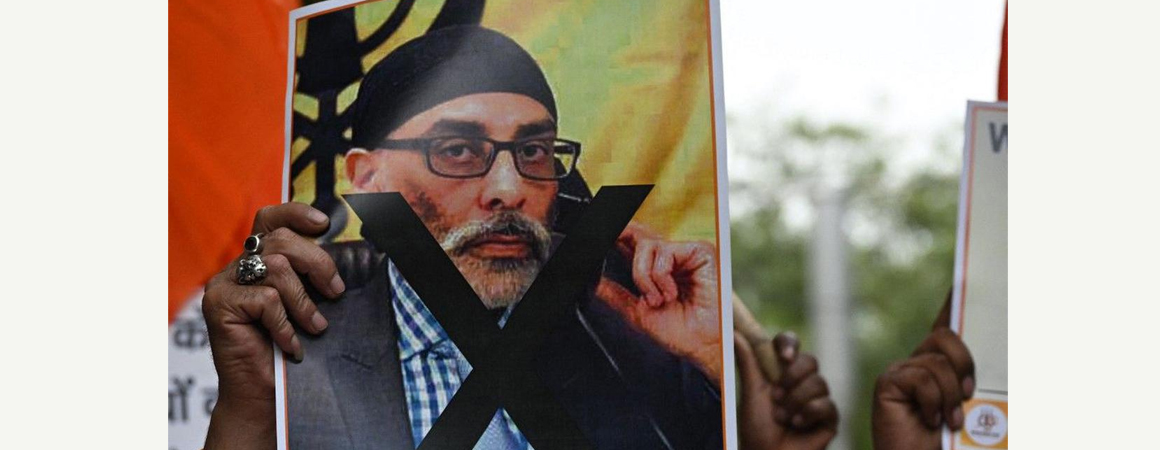FBI Director Chris Wray will arrive in India two weeks after an indictment linked an Indian government official to the Pannun assassination plot, on the basis of FBI, DEA investigations
The U.S. indictment of an Indian national for an assassination plot against wanted Khalistani separatist Gurpatwant Singh Pannun, allegedly directed by an Indian government official, is likely to be at the top of the agenda as the U.S. Federal Bureau of Investigation (FBI) director Christopher Wray travels to India next week.
Mr. Wray, whose visit was announced by U.S. Ambassador Eric Garcetti at an event on Wednesday night, will visit Delhi a few days after the U.S. Principal Deputy National Security Advisor Jonathan Finer, who discussed the Indian government’s decision to set up a high-level enquiry into the case.
The announcement of the FBI chief’s trip came just as a U.S. Senate Foreign Relations Committee hearing got underway on ‘Transnational repression: Authoritarians targeting dissenters abroad’. The committee included the cases of Pannun and the killing of Canadian Khalistani Hardeep Singh Nijjar in statements that sought to club India with countries like Russia, China, and Iran that it accused of targeting “dissidents” in other countries.
FBI investigated Pannun case
“This was the Number One country [that U.S. Secretary of the Treasury Janet Yellen] went to outside the United States, four times this year,” Mr. Garcetti said, highlighting the strength of the India-U.S. relationship at a Global Technology summit organised by the Ministry of External Affairs and Carnegie India in Delhi. “The Secretary of State [Antony Blinken] just came here for the third time; Secretary of Defence [Gen (Retd) Lloyd Austin] for the second time. The FBI director is here next week,” he added, in the first public acknowledgement of the FBI chief’s visit.
He is expected to arrive on December 11 for the first such visit since a senior FBI official visited Delhi in April this year. The MEA did not confirm a date for Mr. Wray’s visit, but said it had been “in the works” for the last few months. “We have robust security, cyber security, counter-terrorism and counter-narcotics cooperation with the US agencies, “ MEA spokesperson Arindam Bagchi said on Thursday, when asked about the agenda of the visit. The FBI, along with the Drug Enforcement Administration (DEA), had carried out the investigation and surveillance of the Indian nationals involved in the alleged assassination plot of Mr. Pannun, a U.S. national, beginning May 2023.
‘Very serious’
Last month, Mr. Blinken said that he had raised the issue during his talks with External Affairs Minister S. Jaishankar when he visited Delhi for the 2+2 dialogue. According to U.S. news reports that have not been denied, Central Intelligence Agency (CIA) director William Burns and Director of National Intelligence Avril Haines had also discussed concerns over a government official’s alleged link to the plot during visits to Delhi in the past few months. On Tuesday, the U.S. State Department said that it took the details of the indictment “very seriously”.
According to the U.S. Department of Justice (DoJ) indictment that was published last week, an unnamed but identified senior Indian government intelligence official had recruited an Indian national Nikhil Gupta, who is involved in the illicit narcotics and arms trade, to hire a hitman in the U.S. for the targeting of Khalistani separatists in the U.S. and Canada.
The Ministry of External Affairs has not denied the charges, but announced the constitution of a high-level enquiry and asserted that such operations are “not government policy”. Both Mr. Pannun and Mr. Nijjar have been on the Home Ministry’s list of terrorists under the Unlawful Activities (Prevention) Act, and the government has requested their repatriation to India, officials said.
‘Backsliding of democracy’
At the U.S. Senate’s hearing on transnational repression, lawmakers heard from activists and experts, including Freedom House president Michael Abramowitz, who expressed concerns over the “backsliding of democracy” in India and other countries, accusing democratic governments of using authoritarian, “repressive measures”, and surveillance to track dissidents.
“For many exiles, human rights defenders, journalists and civil society activists around the world, it takes incredible courage to speak out against autocrats. Both friends and foes send their agents across borders to hunt down and harass critics, even here on U.S. soil. We’ve seen disturbing allegations against an Indian Government official for involvement in planning to assassinate a U.S. citizen in New York who was critical of the Indian government,” said Foreign Relations Committee chair Ben Cardin in his opening remarks, where he also referred to the Nijjar killing. “Transnational repression is not new, but modern technologies have expanded the governments’ reach like never before,” he added.
The Democrat Senator said that he plans to introduce a new International Freedom Protection Act, which will address the growing use of “transnational oppression by autocratic and illiberal states”.
‘Not the behaviour of a respectable democracy’
U.S. Senator Tim Kaine said that the case of India was troubling as other countries that were accused of such operations were “adversaries”, not friends, and proceeded to read out details of the DoJ indictment in the Pannun case.
“We often say we’re the oldest democracy in the world and India is the largest democracy in the world. This is not the behaviour of a respectable democracy,” Mr. Kaine said at the hearing, asking what safeguards the U.S. could use in dealings with a nation with which it has “such strong military connections, economic connections, connections of family” adding that “the Indian American diaspora community in the United States is such an important part of who we are as a country”.
Arms sale ban threat
Without specifically referencing India, U.S. Senator Chris Van Hollen said that he intended to “activate” clauses in U.S. laws that put restrictions on such transnational crimes.
“There is a little known provision in the Arms Export Control Act that prohibits arms transfers to any countries that are, quote, engaged in a consistent pattern of acts of intimidation, or harassment directed against individuals in the United States,” Mr. Van Hollen said, pointing out that while the U.S. does not sell any arms to China, Russia, or Iran, “there are many governments out there that are engaged in this kind of intimidation and harassment of individuals on U.S. soil” that do buy American arms.
As Pannun case heats up in U.S. Senate, FBI chief to visit India
FBI Director Chris Wray will arrive in India two weeks after an indictment linked an Indian government official to the Pannun assassination plot, on the basis of FBI, DEA investigations
The U.S. indictment of an Indian national for an assassination plot against wanted Khalistani separatist Gurpatwant Singh Pannun, allegedly directed by an Indian government official, is likely to be at the top of the agenda as the U.S. Federal Bureau of Investigation (FBI) director Christopher Wray travels to India next week.
Mr. Wray, whose visit was announced by U.S. Ambassador Eric Garcetti at an event on Wednesday night, will visit Delhi a few days after the U.S. Principal Deputy National Security Advisor Jonathan Finer, who discussed the Indian government’s decision to set up a high-level enquiry into the case.
The announcement of the FBI chief’s trip came just as a U.S. Senate Foreign Relations Committee hearing got underway on ‘Transnational repression: Authoritarians targeting dissenters abroad’. The committee included the cases of Pannun and the killing of Canadian Khalistani Hardeep Singh Nijjar in statements that sought to club India with countries like Russia, China, and Iran that it accused of targeting “dissidents” in other countries.
FBI investigated Pannun case
“This was the Number One country [that U.S. Secretary of the Treasury Janet Yellen] went to outside the United States, four times this year,” Mr. Garcetti said, highlighting the strength of the India-U.S. relationship at a Global Technology summit organised by the Ministry of External Affairs and Carnegie India in Delhi. “The Secretary of State [Antony Blinken] just came here for the third time; Secretary of Defence [Gen (Retd) Lloyd Austin] for the second time. The FBI director is here next week,” he added, in the first public acknowledgement of the FBI chief’s visit.
He is expected to arrive on December 11 for the first such visit since a senior FBI official visited Delhi in April this year. The MEA did not confirm a date for Mr. Wray’s visit, but said it had been “in the works” for the last few months. “We have robust security, cyber security, counter-terrorism and counter-narcotics cooperation with the US agencies, “ MEA spokesperson Arindam Bagchi said on Thursday, when asked about the agenda of the visit. The FBI, along with the Drug Enforcement Administration (DEA), had carried out the investigation and surveillance of the Indian nationals involved in the alleged assassination plot of Mr. Pannun, a U.S. national, beginning May 2023.
‘Very serious’
Last month, Mr. Blinken said that he had raised the issue during his talks with External Affairs Minister S. Jaishankar when he visited Delhi for the 2+2 dialogue. According to U.S. news reports that have not been denied, Central Intelligence Agency (CIA) director William Burns and Director of National Intelligence Avril Haines had also discussed concerns over a government official’s alleged link to the plot during visits to Delhi in the past few months. On Tuesday, the U.S. State Department said that it took the details of the indictment “very seriously”.
According to the U.S. Department of Justice (DoJ) indictment that was published last week, an unnamed but identified senior Indian government intelligence official had recruited an Indian national Nikhil Gupta, who is involved in the illicit narcotics and arms trade, to hire a hitman in the U.S. for the targeting of Khalistani separatists in the U.S. and Canada.
The Ministry of External Affairs has not denied the charges, but announced the constitution of a high-level enquiry and asserted that such operations are “not government policy”. Both Mr. Pannun and Mr. Nijjar have been on the Home Ministry’s list of terrorists under the Unlawful Activities (Prevention) Act, and the government has requested their repatriation to India, officials said.
‘Backsliding of democracy’
At the U.S. Senate’s hearing on transnational repression, lawmakers heard from activists and experts, including Freedom House president Michael Abramowitz, who expressed concerns over the “backsliding of democracy” in India and other countries, accusing democratic governments of using authoritarian, “repressive measures”, and surveillance to track dissidents.
“For many exiles, human rights defenders, journalists and civil society activists around the world, it takes incredible courage to speak out against autocrats. Both friends and foes send their agents across borders to hunt down and harass critics, even here on U.S. soil. We’ve seen disturbing allegations against an Indian Government official for involvement in planning to assassinate a U.S. citizen in New York who was critical of the Indian government,” said Foreign Relations Committee chair Ben Cardin in his opening remarks, where he also referred to the Nijjar killing. “Transnational repression is not new, but modern technologies have expanded the governments’ reach like never before,” he added.
The Democrat Senator said that he plans to introduce a new International Freedom Protection Act, which will address the growing use of “transnational oppression by autocratic and illiberal states”.
‘Not the behaviour of a respectable democracy’
U.S. Senator Tim Kaine said that the case of India was troubling as other countries that were accused of such operations were “adversaries”, not friends, and proceeded to read out details of the DoJ indictment in the Pannun case.
“We often say we’re the oldest democracy in the world and India is the largest democracy in the world. This is not the behaviour of a respectable democracy,” Mr. Kaine said at the hearing, asking what safeguards the U.S. could use in dealings with a nation with which it has “such strong military connections, economic connections, connections of family” adding that “the Indian American diaspora community in the United States is such an important part of who we are as a country”.
Arms sale ban threat
Without specifically referencing India, U.S. Senator Chris Van Hollen said that he intended to “activate” clauses in U.S. laws that put restrictions on such transnational crimes.
“There is a little known provision in the Arms Export Control Act that prohibits arms transfers to any countries that are, quote, engaged in a consistent pattern of acts of intimidation, or harassment directed against individuals in the United States,” Mr. Van Hollen said, pointing out that while the U.S. does not sell any arms to China, Russia, or Iran, “there are many governments out there that are engaged in this kind of intimidation and harassment of individuals on U.S. soil” that do buy American arms.






NO COMMENT